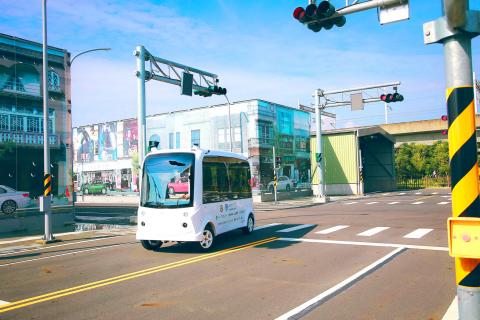The Ministry of Economic Affairs is reviewing a proposal for a self-driving bus in Taipei that would begin testing on Xinyi Road and open for a public trial as early as the second quarter next year.
“If road test results are good, we will open it for passengers to ride,” Taipei Department of Transportation Director Chen Hsueh-tai (陳學台) said on Saturday.
Road tests and possible future operations would occur after midnight, when Taipei’s MRT railway system or buses are unavailable, he said.

Photo: Tsai Ya-hua, Taipei Times
The project was proposed by Turing Drive Inc, a local company that has run two successful tests at Taichung-based Lihpao Land (麗寶樂園) and the Taoyuan Agriculture Expo, he said.
Running on Xinyi Road’s bus lane late at night requires no lane changing and affects fewer people during the test period, he added.
The Ministry of Transportation and Communications would issue a trial bus plate after the proposal is approved, followed by a testing period of two to three months from 12:01am to 2am, before opening bus for free public trails from 12:01am to 5am, he said.
Sensors would be installed at wider intersections to help the bus to recognize traffic signs, and the testing speed would be set at 30kph, department officials said, adding that the law requires a staff member to ride the bus for manual intervention in the case of an emergency.
Cameras installed on the bus would monitor real-time traffic situations and report driving conditions to Turing Drive and the city government, they said.
Taiwan would follow a global trend in limiting the buses to late-night operation, as current technology is not mature enough yet to run them during the day, Chen said.
Two years ago, the city government closed the two-way bus lane on Xinyi Road to test French company 7Star Lake’s driverless shuttle EZ10, which Taipei Mayor Ko Wen-je (柯文哲) rode. However, the bus failed to distinguish traffic lights, and did not pass the review.

Alain Robert, known as the "French Spider-Man," praised Alex Honnold as exceptionally well-prepared after the US climber completed a free solo ascent of Taipei 101 yesterday. Robert said Honnold's ascent of the 508m-tall skyscraper in just more than one-and-a-half hours without using safety ropes or equipment was a remarkable achievement. "This is my life," he said in an interview conducted in French, adding that he liked the feeling of being "on the edge of danger." The 63-year-old Frenchman climbed Taipei 101 using ropes in December 2004, taking about four hours to reach the top. On a one-to-10 scale of difficulty, Robert said Taipei 101

Nipah virus infection is to be officially listed as a category 5 notifiable infectious disease in Taiwan in March, while clinical treatment guidelines are being formulated, the Centers for Disease Control (CDC) said yesterday. With Nipah infections being reported in other countries and considering its relatively high fatality rate, the centers on Jan. 16 announced that it would be listed as a notifiable infectious disease to bolster the nation’s systematic early warning system and increase public awareness, the CDC said. Bangladesh reported four fatal cases last year in separate districts, with three linked to raw date palm sap consumption, CDC Epidemic Intelligence

US climber Alex Honnold left Taiwan this morning a day after completing a free-solo ascent of Taipei 101, a feat that drew cheers from onlookers and gained widespread international attention. Honnold yesterday scaled the 101-story skyscraper without a rope or safety harness. The climb — the highest urban free-solo ascent ever attempted — took just more than 90 minutes and was streamed live on Netflix. It was covered by major international news outlets including CNN, the New York Times, the Guardian and the Wall Street Journal. As Honnold prepared to leave Taiwan today, he attracted a crowd when he and his wife, Sanni,

Two Taiwanese prosecutors were questioned by Chinese security personnel at their hotel during a trip to China’s Henan Province this month, the Mainland Affairs Council (MAC) said yesterday. The officers had personal information on the prosecutors, including “when they were assigned to their posts, their work locations and job titles,” MAC Deputy Minister and spokesman Liang Wen-chieh (梁文傑) said. On top of asking about their agencies and positions, the officers also questioned the prosecutors about the Cross-Strait Joint Crime-Fighting and Judicial Mutual Assistance Agreement, a pact that serves as the framework for Taiwan-China cooperation on combating crime and providing judicial assistance, Liang